CLICK ON IMAGES TO ENLARGE. REPEAT IF REQUIRED.
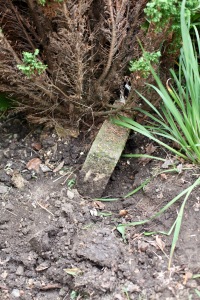 I believe I could be forgiven for thinking that we had dug out all the buried concrete blocks from the garden. Jackie, on continuing with her splendid end of summer planting, weeding, and tidying, discovered that this was not so. In particular she is redesigning the area between the greenhouse and the Dragon Bed. This is where she came across one. I rendered a modicum of assistance in its removal.
I believe I could be forgiven for thinking that we had dug out all the buried concrete blocks from the garden. Jackie, on continuing with her splendid end of summer planting, weeding, and tidying, discovered that this was not so. In particular she is redesigning the area between the greenhouse and the Dragon Bed. This is where she came across one. I rendered a modicum of assistance in its removal.
Also extracted was a large clump of ornamental grass from which we removed stubborn lumps of earth which Jackie returned to the hole whilst I carted the unwanted plant to an orange bag of garden refuse.
I then scanned the next dozen of my Streets of London series of colour slides, produced from November 2004 to April 2005
We learn from https://www.greeneking-pubs.co.uk/pub/audley-mayfair/c3003/ that ‘The Audley was established in 1730 as The Bricklayers Arms and was rebuilt in 1888 on the instructions of the Duke of Westminster, who oversaw the redevelopment and transformation of Mount Street. The Duke allowed the landlord to retain the license for the establishment but they had to change the name to the more courteous ‘Audley Hotel’.
Thomas Verity was chosen as the architect for the development, he was the architect for the Criterion Theatre and the Pavilion at Lord’s Cricket Ground. The Audley’s superb striped façade and decorative wrought ironwork was completed in 1889. Many characteristics of Thomas Verity’s original design are still present today, including some late-Victorian woodwork and a clock situated in the main bar.
Original crystal chandeliers and its ornate interior give it a sense of old-world greatness that is in keeping with its prestigious location. At The Audley you’ll find a welcoming atmosphere, an excellent range of cask ales and delicious food.’
It stands on the corner of Mount Street and
South Audley Street W1. One of Mayfair’s major shopping streets it runs north to south from the southwest corner of Grosvenor Square to
Curzon Street seen here sharing a corner with Clarges Street. Tesco’s Metro, housed in this building is one of that supermarket’s chain of small outlets largely designed for young people who are wealthy and busy enough not to do their own cooking. Ready prepared microwaveable meals and snacks are their speciality.
Hill Street, Wikipedia tells us ‘is a street in the central Mayfair district of London which runs southwest from Berkeley Square towards Park Lane. It was developed from farmland in the 18th century[3] and was named after a small hill there. It became a fashionable street in the 18th century and was home to a number of lords. The street contains several Grade I and Grade II listed buildings.’
The side of this pictured building stands on Waverton Street, in late 2004 the home of The Red Lion pub. Since I passed this way the pub has been demolished and been replaced by a residential property http://wetherell.co.uk/wetherell-blog/red-lion-house-waverton-street/ informs us is valued at £25,000,000 (yes, six noughts).
‘A former Public House, [we are told] Red Lion House was recently featured in The Mail Online. With interior design by Bill Bennette, this beautiful newly built virtually detached house covers seven floors and boasts fantastic entertaining space, a swimming pool, cinema, two roof terraces and a master bedroom suite that occupies the entire first floor.
The elegant reception room on the ground floor opens onto to a 216 sq ft patio and the reception room on the lower ground floor leads on to an exquisite double height dining room and bespoke marble kitchen.
Three guest bedroom suites are situated on the second floor whilst the master suite with dressing areas, morning room and his & her bathrooms occupies the entire first floor.
The lower part of the house offers a swimming pool complex with steam room, gym with shower room and a media room. There is also a maid’s bedroom with shower room on the ground floor with its own side entrance to the house.’
Wetherell’s site includes a great number of photographs. Readers may, or may not, think this is an improvement.
Hill Street meets Farm Street at another corner. http://www.jesuit.org.uk/church-immaculate-conception tells us that ‘The Jesuit Church of the Immaculate Conception – familiarly known as Farm Street Church – is situated in the Mayfair area of central London. From 1849 (when it was opened) until 1966, it was simply a Jesuit church, open to the public but not the centre of worship for a parish. Its reputation rested on the pulpit and the confessionals and it became famous for the preaching and spiritual guidance of the Jesuit community. Since 1966, the church has been at the heart of a parish in the centre of Mayfair in the Archdiocese of Westminster. Its Jesuit community of priests and brothers are either attached specifically to the church, work in other apostolates or are retired. The parish attracts its congregation not only from all over London and the surrounding area but also visitors from all over the world. The church remains a haven of peace and beauty in a very busy part of the capital.’
‘The Coach and Horses is one of the best-known British pub names. In London alone there are still over fifty Coach and Horses pubs. For many centuries, prior to the invention of the railway systems, horse drawn carriages were the only means of travelling between towns and cities. Most famously in London, hackney carriages became an essential part of life. These consisted of a horse and carriage and licensed for hire since 1662, their job was to whisk city folk about their business both day and night before they were succeeded by the Hansom Cab. The Hansom cab was a variant of horse-drawn carriage designed and patented in 1834 by York born architect Joseph Hansom.’ So says https://www.greeneking-pubs.co.uk/pub/coach-and-horses-mayfair/s5155/
This one is actually in Bruton Street, on the corner of Hay’s Mews.
Splendidly elegant railings protect the staircase down to the basement of this property in Charles Street, once the home of
https://www.londonremembers.com/memorials/spirit-of-soho-mural tells us that ‘The Spirit of Soho mural [in Broadwick Street] was created by the Soho community and completed in 1991. It shows Soho life and is dedicated to the people of Soho. The mural depicts St Anne presiding over local notables; her skirt and petticoats show the map of Soho, craftsmen and London landmarks. Framed underneath are the portraits of Soho’s many famous figures. Dogs and hares are interspersed which represent a time when Soho was a Royal hunting ground.
Restored in 2006 by Shaftesbury PLC and The Soho Society, the clock was re-activated by The Lord Mayor of Westminster 19th October 2006. Don’t miss: When the clock strikes on the hour: watch actress and opera singer Theresa Cornelys winks at Casanova, Casanova blows a series of kisses to Cornelys and Karl Marx takes a sip of Coca Cola.’
The Kingly Court Showroom at No 1 Kingly Street is in the fashionable Carnaby area parallel with Regent Street.
Kingly Street forms a T junction with Beak Street which according to Wikipedia
‘is named after Thomas Beake, later one of the Queen’s messengers, who, in the late 17th century, obtained the land on the north side, between Regent and Kingly streets. The name Beak Street first appeared in the ratebooks for 1689, and in 1691 it was ordered that the street be paved with stone.
‘St Christopher’s Place, W1, a short popular pedestrianised shopping street between Oxford Street and Wigmore Street, was decorated with wrapped gift parcels on my visit.
This evening we dined on Jackie’s superb sausages in red wine; crisp cauliflower and carrots; and creamy mashed potato. I drank Louis Chamandiet Cairanne 2015.
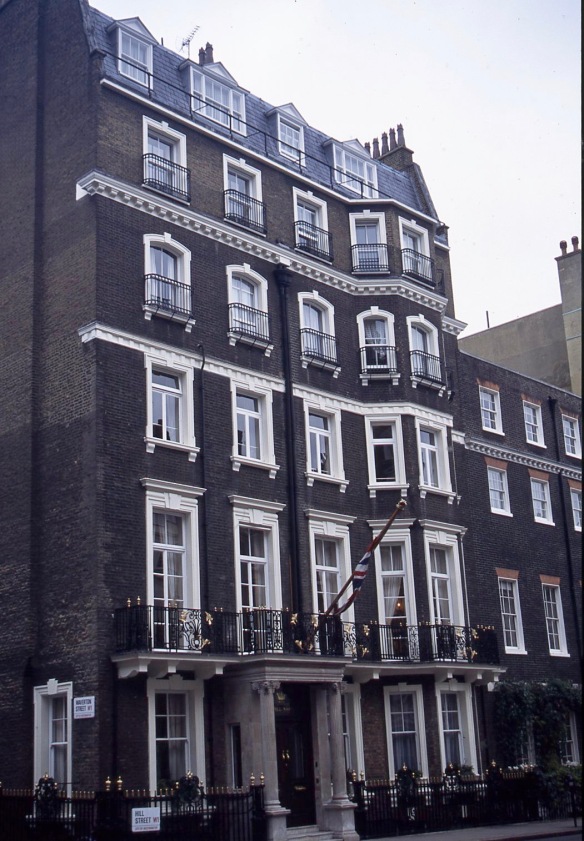
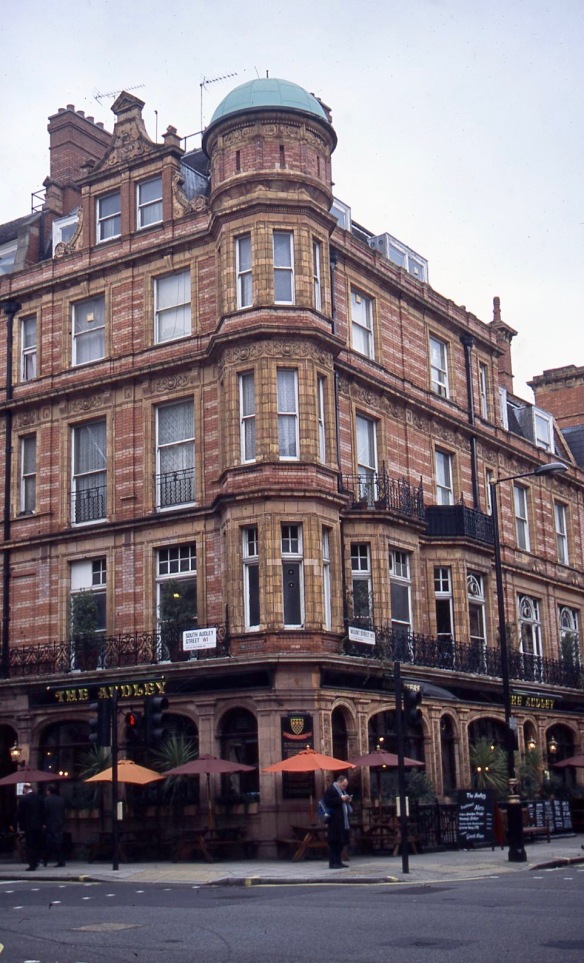
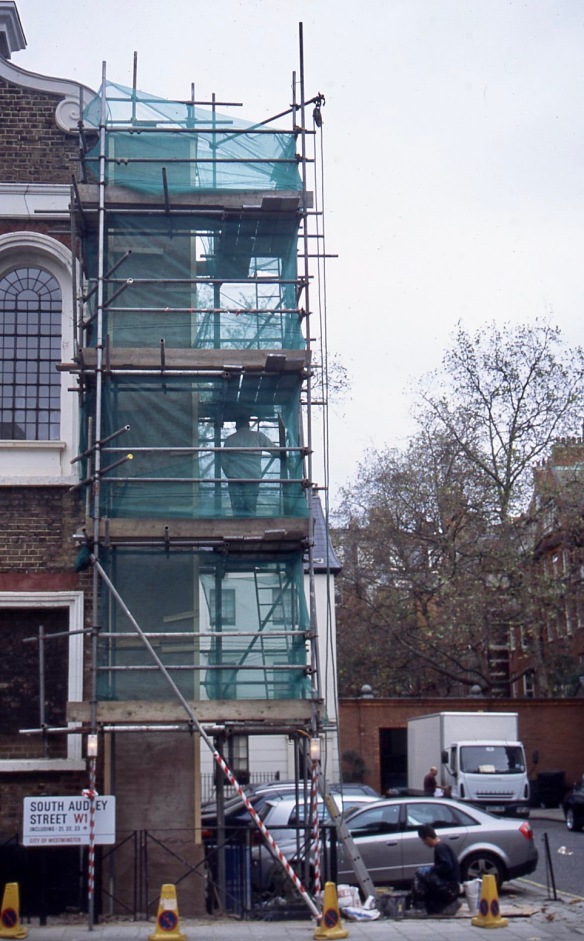
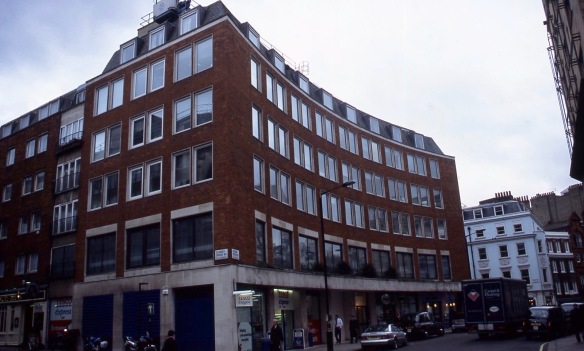

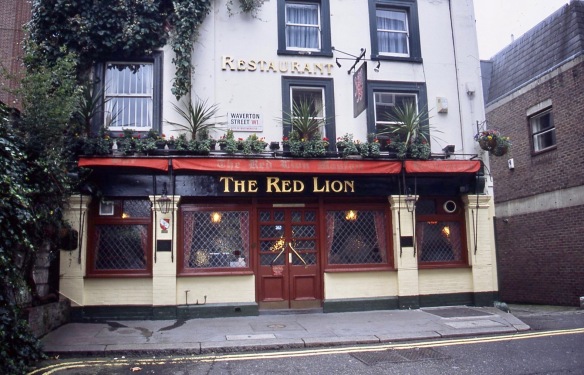
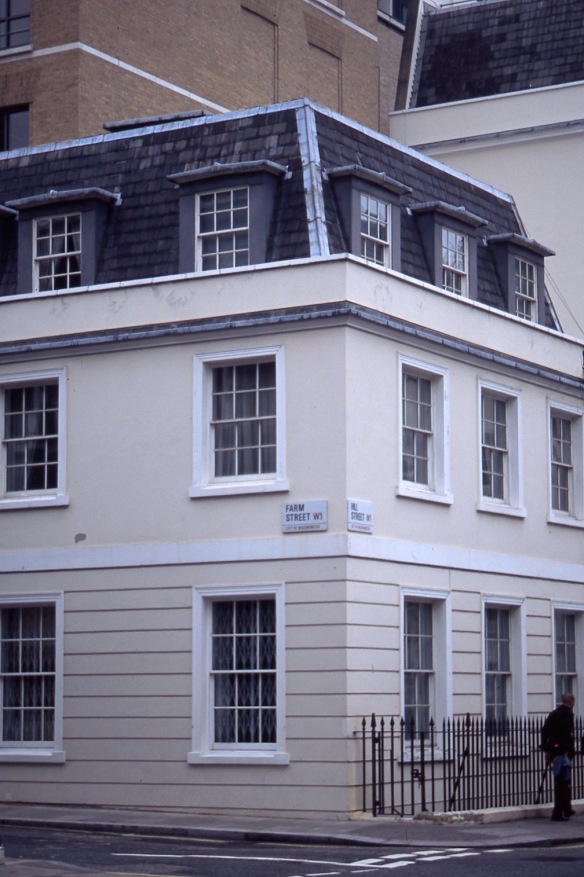
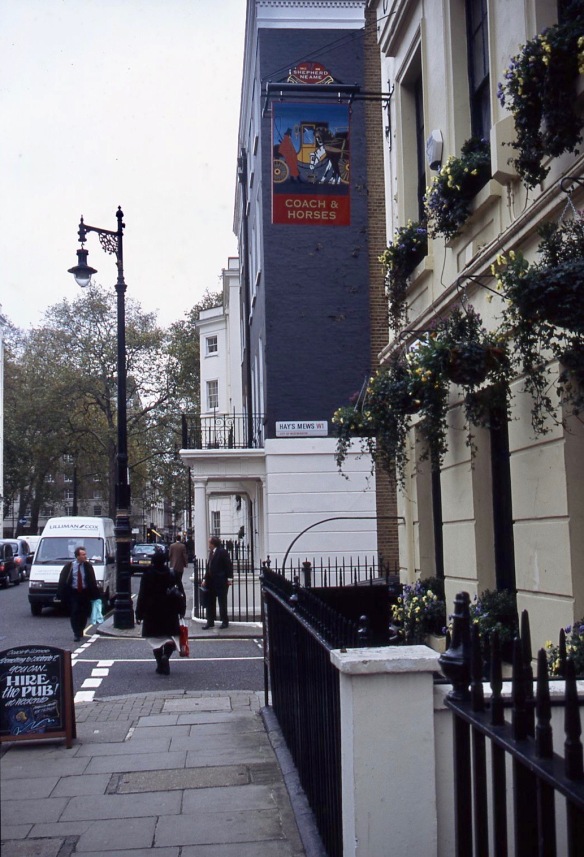

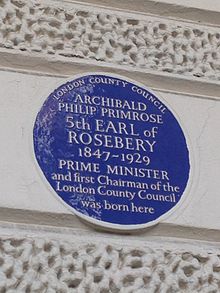
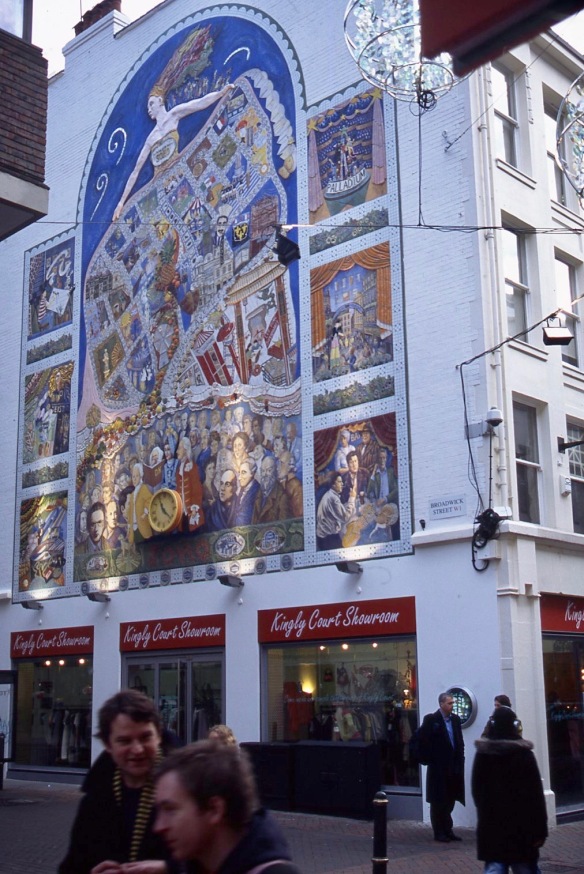

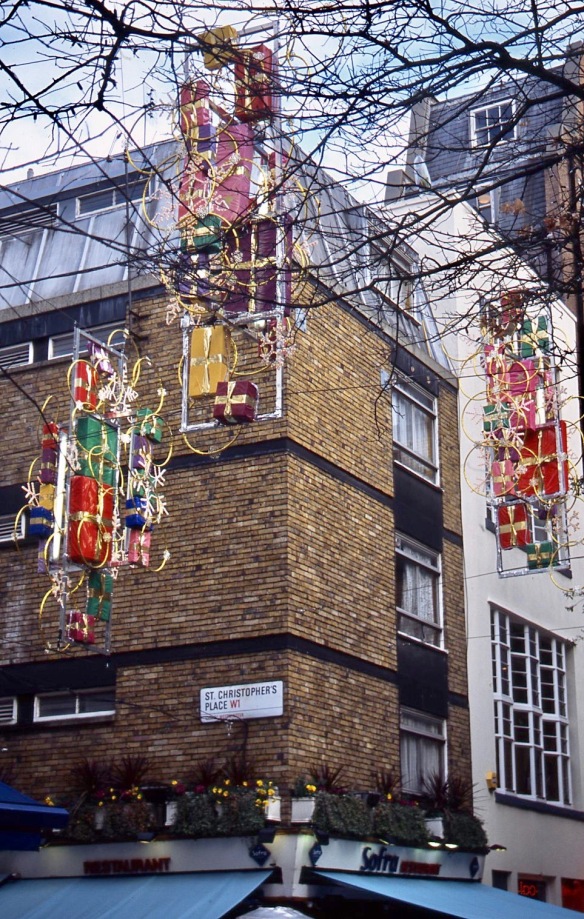
What an interesting tour! The difference between the haves and the have-nots is definitely widening….. and sometimes I wonder about the sanity of the world. I think I prefer ponies 🙂
Many thanks, Pauline. Me too
Great pictures, Derrick. The Red Lion, the former pub; even if I were a billionaire, I would’t purchase that house! Turn it back into a pub, I say. 🙂
Many thanks, Persia
I love that area of London … my walk to work for many moons and many dreams it prompted. The pulling of the stone is rather akin to the pulling of the tooth, I would warrant.
Pretty much, Osyth. What was to become the Rose Garden was full of them. Many thanks.
Sounds like the story of my life!!
Such beautiful buildings, and I especially like the Soho mural. Thanks for sharing your tour.
Many thanks, Van
Red Lion House is not my cup of tea at all, too modern and sterile for my taste. Still, as I will never have 25 million my opinion is academic, isn’t it?
Mine, too, Gwen
Thanks for the fascinating London tour Derrick, some gorgeous old buildings.
Many thanks, Ivor.
I wondered who owns the Red Lion House? Hitherto, my only experience with Mayfair Street had been on the blocks of Monopoly that I play with my daughters sometimes. Sparkling photographs as usual.
Many thanks, Uma. Prices in Mayfair are scary
You’re a great tour guide, Derrick!
Many thanks, Jill
I first tasted a Fullers London Pride in the Red Lion. A few years ago now.There should be a law against pulling down these buildings.
Wow. That’s amazing, Paol. Yes. Somebody has made some money
I enjoyed this trip through the streets of old London. I miss London sometimes, because I grew up there.
Thanks very much, Sherry. I do remember that you did, and think of you when I write these posts
Thanks. I’m honored. 🙄
I love the names of the pubs in England:)
Many thanks, Lakshmi
Thank you for taking us there, Derrick!
And thank you, Amy
I’m looking forward to Jackie’s new project with the Dragon Bed! It appears that dragons have been running rampant on WordPress this morning as I visit you from poet plumber, Ivor’s blog.
You’re an encyclopedia, Sir Knight! My mind is swimming with historical figures and gorgeous architecture. I do love St. Anne’s majestic gown! 🌹
Many thanks, Rose. Ivor is certainly flying with his dragon.
I am an architecture, so every time you post photos of UK buildings and houses, etc. it is much appreciated! And the history and neighborhood info makes it that much more satisfying, of course. 🙂
Many thanks, Cynthia. I didn’t know that. I’ll slip some more in
Thanks! (Ack, architecture NUT is what I meant–but you got that already!)
Chortle
Awesome pictures, Derrick…I cherish that zone of London … my stroll to work for some moons and many dreams it incited..
Thank you, Satpura
As I have noticed in this and other posts, many places here in the Eastern United States carry the names of places you mention. A lovely photo trip through London. I popped over to the house. That’s crazy luxury. At least they kept the name Red Lion.
Many thanks, Robin. The early settlers from England hit your land first. I expect that house was designed with wealthy Arabs in mind
….or the new Russian billionaires; just how and where did they get all these billions? 20 years or so ago they were all poor communists and equals?
Ten again perhaps they prefer their private yachts
Quite
£25,000,000, “virtually” detached, just the one maid’s bedroom? Has the world gone mad?
For £25,000,000 I’d want a properly detached house with a servants’ wing. And £24,000,000 change.
Quite, Quercus. Unquestionably for a Qatari. Many thanks
Nice use of the Q Derrick – you are obviously on form today. 🙂
I checked up “alliteration”, wanting to see if the third one counted, and am now better informed, though not necessarily wiser.
🙂
🙂
Thanks for the tour and wonderful history facts. It’s hard for us (Montana) to comprehend streets whose names have had the same name since 1689 when our first settlement wasn’t until 1847.
A salutary comment, Jerry. Many thanks
Love that mural.
Many thanks, Mary.
I love that St. Anne’s mural, and what looks like a good use for old CDs! 🙂
Many thanks, Lavinia. Those CDs are very effective
WOW! This is marvellous, held me from go to whoa.
I think that now that that Duke of Westminster is now dead and gone they should revert back to the “Bricklayers Arms”.
That 7 storey £25 million house I only counted 3 floors above ground……………..
It’s sacrilege to pull down a pub like the Red Lion, time to bring back the hang, draw and slaughter punishment for these evil doing, money hungry, developers
Thanks a lot, Brian. That’s Mayfair for you.
Hi Derrick
I am writing a book on London’s ‘lost’ pubs and I was wondering if there was any chance of using your excellent photo of the Red Lion while it was still trading?
It would of course be fully credited in addition to thanks in the acknowledgements section.
I would be happy for you to do that, Sam